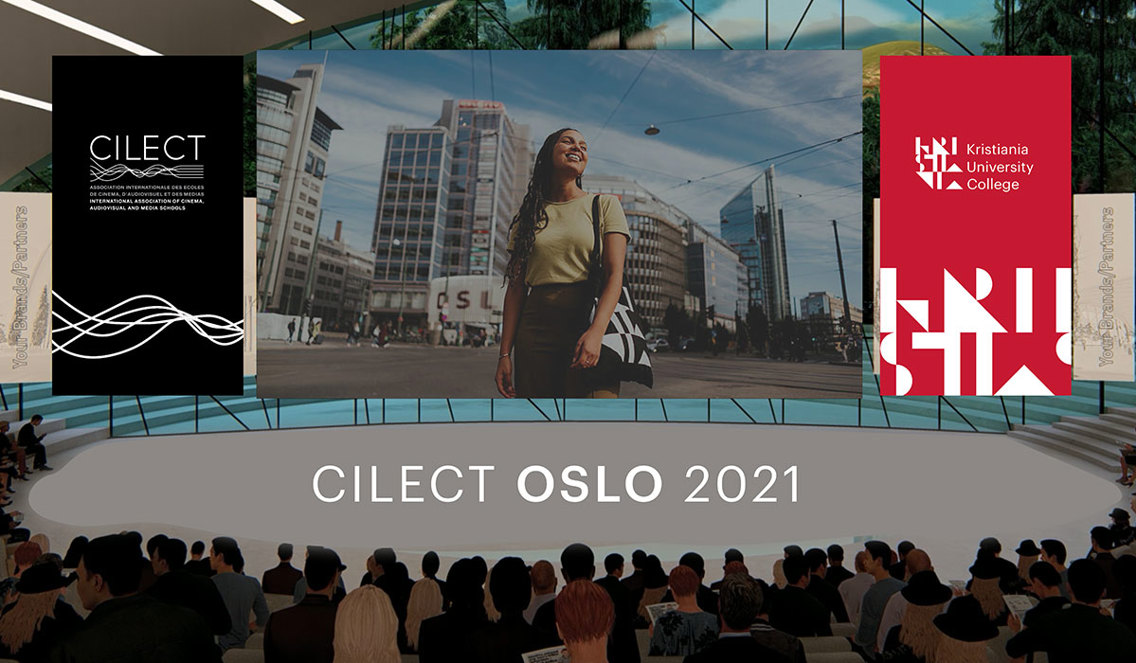Global film festival is made fully digital
Together with the film school organization CILECT, Kristiania University College is arranging a congress on impact and relevance. Kristiania was originally supposed to be the physical host in the autumn of 2020, but the party in Oslo was postponed due to the corona. Now everything happens digitally!
The conference this year is fully digital and will take place on the 12th to the 14th of October. This year’s theme is Audiovisual Education: IMPACT AND RELEVANCE.
By focusing on impact and relevance in this conference, the aim is to emphasize the multiple spheres of influence that images and stories have. Access to technology and the changes in audiences’ adoption to new platforms, requires a re-examination of education.
The past one and half year has truly showed us the importance of storytelling, both in the world of news casting and in the world of on demand entertainment. During the corona pandemic, streaming and access to content from our own homes have never seemed more important.
Disruptive streaming
The global streaming platforms are disrupting traditional film and linear television.
The competition to make an IMPACT is stronger than ever. However, impact comes with both positive and negative connotations. Images can produce new ideas, but can also reinforce negative cultural stereotypes. Stories can shed light on human coexistence, but can also reproduce dominant ideologies. RELEVANCE in this context relates to audio-visual education and societal change. Further relevance also is focusing on the audience, what need do they have, and what context is the content experienced and consumed within.
CILECT therefore address questions such as:
- How do we educate students who already have a lot of experiences with a huge audience?
- Which elements shape the audio-visual curriculum in the time of transformation of the technological means and the distribution platforms?
- What are the new storytelling models in the age of serial-and multilinear drama?
- How can we bridge the gap between screen production practices, screen production education and practice-led research for the screen art?
- What is the role of schoolsand teachersin regard to the socio-political implications of audio-visual education?
- How do we prepare our students for storytelling in a post-pandemic area?
Westerdals Department of Film and Media at Kristiania University College became a member of CILECT - the International Association of Film and Television Schools in 2016. Since then, Kristiania has been an active member of the Association. At the CILECT-Congress in 2018, which was held in Mumbai, Oslo was appointed the next location for the physical congress in 2020. Due to the pandemic it was cancelled and postponed until now – October 2021, as a global digital conference.
Westerdals Institute for film and media has continuously been growing a strong international reputation. This is especially due to the success of our students being nominated and winning international awards such as BAFTA.
As an institution we make sure that our students can solve complex problems and that they collaborate and practice their arts with fellow students. This strategy ensures that they gain competences relevant for their professional life throughout their career. Westerdals believes in prepping the students to be agents of change, making them able to make the world a better place.
The lecturers also continue to increase their work of artistic research, and the big majority function as active professionals in the industry. Westerdals offers Bachelor programs in:
- Screen Writing
- Film and TV
- Directing
- Editing
- Cinematography
- Production
- Sound design
- Visual Effects
- 3D Graphics
- Games Design
Westerdals is a part of School of Arts, Design and Media that has a department for music, performing arts, and design and creativity. This great width of creative fields within Kristiania University College makes it possible to conduct cross disciplinary collaborations, and thus prepare the students for life after school.
– It is a pity that we do not get to show Oslo
International collaboration and exchange of experience is an important part of the initiative for SchoolofArts, Design, andMedia. The university college staff has been able to make professional contributions at conferences abroad over the years, and now it is our turn to be a host and partner for CILECT centrally. Kristiania University College has, among other things, stood for the visual profile that characterizes the virtual conference hall.
– For us as hosts, it is a pity that we do not get to show Oslo and our fantastic campus, our students and staff. But by arranging and profiling ourselves, we strengthen our position internationally. We will be shown through the congress, and will be presented with a film about the school, says Leif Holst Jensen, head of Westerdal's institute for film and media.
CILECT (Center International de Liaison des Ecoles de Cinéma et deTélévision) is an association of 180 film schools from 65 countries, with over 9000 professional and 55000 young people in education.
Two years waiting time over
Leif Holst Jensen is the man who for almost two years has held the counter-conference in the many threads. Since 2016, when the college became a member of CILECT, he has participated in the conference in both India and Russia.
For all film schools around the world, it is important to ensure that students tell stories that reach out and that are important to the audience they meet.
– The theme for the congress is IMPACT and Relevance. For all film schools around the world, it is important to ensure that students tell stories that reach out and that are important to the audience they meet. The competition for attention is enormous, and it is important that the students are prepared for the reality they are going into, and that they can find methods and working methods that work, he says.
